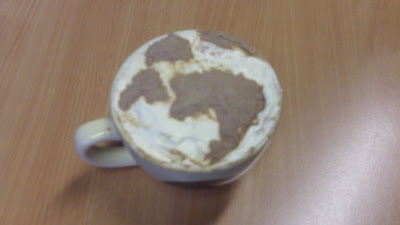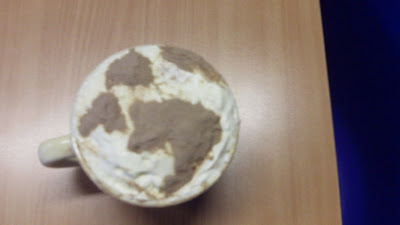Print advert

Radio advert
The overall feedback we got was that they liked the fact we got in touch with the right kind of people "seek ed medical advice from a credited NHS nurse" "manager of a coffee shop". The documentary was "quite easy to watch" because of the narrative structure and the voice over "sounded like he was excited about talking about coffee" and that he also sounded like he himself had drank plenty of coffee!. From our audience feedback it was obvious that the overall sound quality wasn't too good and that this area could have been improved. I was fed back that when using the blue screen the tape had a blip so to watch it was a bit distracting to concentrate on the content. The title montage of the girl making a cup of coffee, this footage appears to be a bit shaky and made the whole sequence low in quality, this could have been overcome by making sure the tripod was fully secure before starting to film. Some of the constructive criticism was that in the nurse's interview and the coffee worker the framing wasn't the best it could have been and the mis en scene wasn't entirely relevant.
I further posted my documentary on facebook to gain some more feedback. Below is a picture of the comments I received.
The majority of people said that it looked very professional. A few people said we actually taught and informed them of something they did not know before, which is a role that documentaries should fulfill. The feedback included the fact that the sound was too quite, again this is something that we could improve and make better. One of the people commented on the use of voice over script and said that he asked a rhetorical question which he was actually wondering at the time. On a whole I have learnt that we should have sorted out the sound quality and quality of blue screen footage.
Here are a few graphs conducted from the rating questions and what I learnt from these;





We then proceeded to film an interview about mobile phones for a documentary.
Planning
First we had to figure out the general aim of the interview. Which we decided on how teenagers rely heavily on their mobile phones. We planned out 10 questions for the interview and where it would take place. We did not plan where to do the cutaways as it is hard to make the cutaways relevant before if you film them before the actual interview.
Filming
We were issued with the equipment we needed and then went to film the interview outside. We decided to change the initial location to inside in front of the blue screen due to the weather conditions. We had to make sure that when the interviewee was answering the questions that he answered in full sentences so when the questions are edited out the answer still makes sense. We then filmed a few relevant cutaways of people texting, playing games and generally using their phones.
Editing
When editing we dealt with the questions by editing them out and leaving the answers using simple cuts. We used fades on the audio to avoid jumps and used a few cutaways over some of the jumps. We hadn't filmed enough cutaways so in the end we used some still images from the Internet.
Evaluation
If we were to do this task again we would have to think more carefully about the appropriate location of filming and filmed more relevant cutaways. We could use a background which contains mis en scene related to mobile phones instead of leaving the blue screen in.
The ideas we discussed;
Obsessive Compulsive Disorder
It is an interesting subject which may a attract young audience as well as people interested in psychology in general. Two members of our group study psychology as one of their A-levels so they have some knowledge in this area which may increase reliability of our documentary. However, if we decided on this idea, we would need an expert (possibly a psychiatrist, or at least a psychologist) to add authenticity. Otherwise, the documentary would not seem as authoritative (which we aim for). It would be more reliable and valid if we got a person with OCD which would be difficult and may be a breach to their confidentiality.
Football Hooligans
This seemed like an exciting idea which would be interesting to investigate. It would extend our personal knowledge on the psychology which is helpful for other subjects as well. It wouldn't be to difficult to find an expert on the psychology behind the behaviour as the subject is very widely used recently. This topic effects many young and old so the range of opinions would be something we could research into. There are many famous fights which have been filmed which we could used for archive material. However finding a real hooligan would be dangerous and if we were to do this the person would have to be kept anonymous with blur and voice effects.
Coffee
At first coffee seemed like a dull idea however as we decided to research some more information about it, it seemed to be the best of the three because there are many things we thought we could include in the documentary about coffee, for instance coffee addicts, various types of coffee, people’s habits (morning coffee etc.), sociological effect of coffee on relationships (e.g. when people ‘go for a coffee’ it might mean they want to catch up), unusual coffees and the list goes on. It would also be easy to find people talking about coffee because almost everyone this beverage. Moreover, if most of the people drink it, then our target audience will be broader (and we mainly aim at people at the age of 16 and more, and/or business people). In the town centre there are many coffee shops we could go to film how different coffees are being prepared and ask an ‘expert’ (someone who’s worked there for a long time) questions ‘coffee-related’. As our 10% archive material we could use short clips from coffee factories (‘’How It’s Made’’ etc.)
A copy of our questionare



Do you enjoy watching documentaries?
Yes No

What type of documentary interests you the most?
Reflective Nature Lifestyle Entertainment Economic Social Political Science
 The most popular subject type is health, lifestyle and social therefore our documentary should investigate the health effects of coffee, how coffee is a part of a lifestyle and how coffee effects people social lives. Least popular was reflective so will should not reflect on annecdotal stories about coffee.
The most popular subject type is health, lifestyle and social therefore our documentary should investigate the health effects of coffee, how coffee is a part of a lifestyle and how coffee effects people social lives. Least popular was reflective so will should not reflect on annecdotal stories about coffee.
 Lots of people do drink coffee, a few do not. Our documentary could target both of these by investigating into how coffee should be drank, wether its changed over years and different types of coffee.
Lots of people do drink coffee, a few do not. Our documentary could target both of these by investigating into how coffee should be drank, wether its changed over years and different types of coffee.
 No one thought that coffee could be drank cold and were disgusted by the idea. We could inform in our documentary other ways of drinking coffee an the many different unknown tastes.
No one thought that coffee could be drank cold and were disgusted by the idea. We could inform in our documentary other ways of drinking coffee an the many different unknown tastes.Primary Research
Our Interviewees
Interview with Rhode Island Coffee’s manager/worker – 25/10 (filmed again on the 8th November)
Interview with an NHS nurse – 27/10, rearranged for 25/10 (she was interviewed again on the 14th November)
Interview with coffee and tea enthusiast – 13/11
Interview with Café Nero’s worker – 12/11
Interview with a coffee drinker – 25/10
We are also going to ask people on the street if they like coffee and see how many of them responds and ask if they would drink coffee made from civet’s faeces (after interview with Rhode Island manager).
We are going to take some photographs during the filming process and use them as cutaways. Also we will film some of our family members or friends in certain situations, e.g. when drinking coffee and use it as a relevant cutaway shot.
Filming locations:
ASDA
Rhode Island Coffee Shop
Golden Square Shopping Centre
Café Nero
Priestley College (to use blue screen)
Inside our houses
Photographs taken for our print advert:


























